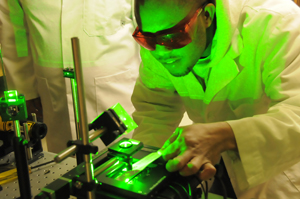Feb 28 2011
Delaware State University has licensed its new Laser-Induced Breakdown Spectroscopy-Tag Method (LIB-Tag), developed by its optics researchers, to Photon Machines, a specialist in developing sophisticated laser technology-based instruments. Meanwhile, the university is trying to get a patent for this groundbreaking technology.
 The research in the DSU Optics Program
The research in the DSU Optics Program
The innovative technology utilizes laser to analyze the metal particles that combine themselves to enzymes or proteins in blood or other kind of bodily fluids. The principal researcher for the optics laboratory of the Delaware State University, Noureddine Melikechi, stated that the new laser technology could diagnose rare-to-detect ovarian and brain cancers and other diseases. The spectroscopy-based procedure is much quicker, sophisticated and effective than the existing biotechnology method.
Steve Buckley, President at Photon Machines, commented that the new laser technology would be a significant development in biomedical diagnostics. This could be a major breakthrough in health care as a person’s health is determinable by the analysis of protein in blood.
The National Science Foundation funded a $5 million research grant in 2006 and the National Aeronautics and Space Administration (NASA) funded another $5 million research grant in 2009 to the university’s Optics Program.